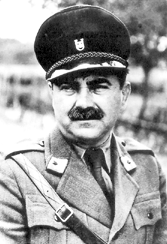Mile Budak
| Mile Budak | |
|---|---|

Mile Budak
|
|
| 3rd Foreign Minister of the Independent State of Croatia | |
|
In office 23 April 1943 – 5 November 1943 |
|
| Leader | Ante Pavelić |
| Preceded by | Mladen Lorković |
| Succeeded by | Stijepo Perić |
| Ambassador to Nazi Germany | |
|
In office 2 November 1941 – 23 April 1943 |
|
| 1st Minister of Education of the Independent State of Croatia | |
|
In office 16 April 1941 – 2 November 1941 |
|
| Leader | Ante Pavelić |
| Preceded by | Office established |
| Succeeded by | Stjepan Ratković |
| President of the Croatian State Leadership | |
|
In office 12 April 1941 – 16 April 1941 |
|
| Preceded by | Office established |
| Succeeded by | Office abolished |
| Personal details | |
| Born |
30 August 1889 Sveti Rok, Kingdom of Croatia-Slavonia, Austria-Hungary |
| Died | 7 June 1945 (aged 55) Zagreb, FPR Yugoslavia |
| Political party | Ustaše |
| Occupation | Politician, writer |
| Profession | Lawyer |
| Religion | Roman Catholic |
Milan "Mile" Budak (30 August 1889 – 7 June 1945) was a Croatian politician and writer best known as one of the chief ideologists of the Croatian fascist Ustaša movement, which ruled the Independent State of Croatia during World War II in Yugoslavia from 1941–45 and waged a genocidal campaign of extermination against its Roma and Jewish population, and of extermination, expulsion and religious conversion against its Serb population.
Mile Budak was born in Sveti Rok, in Lika, which was then a part of the Austro-Hungarian Empire. He attended school in Sarajevo and studied law at the University of Zagreb. In 1912, he was arrested by Austro-Hungarian authorities over his alleged role in the attempted assassination of Slavko Cuvaj, Croatian ban (viceroy).
Budak and Vladko Maček served as lawyers representing Marko Hranilović and Matija Soldin at trial amid the January 6th Dictatorship. On 7 June 1932, he survived an assassination attempt by operatives close to the Kingdom of Yugoslavia. Afterwards, he migrated to Italy to join the Ustaše and become the commander of an Ustaše training camp. In 1938, he returned to Zagreb where he began publishing the weekly newspaper Hrvatski narod. In 1940, the authorities banned the newspaper and he was arrested. On 31 March 1941, in a joint letter to Hitler, Pavelić and Budak asked him "to help Croatian people establish an independent Croatian state that would encompass the old Croatian regions, among them Bosnia and Herzegovina".
...
Wikipedia
